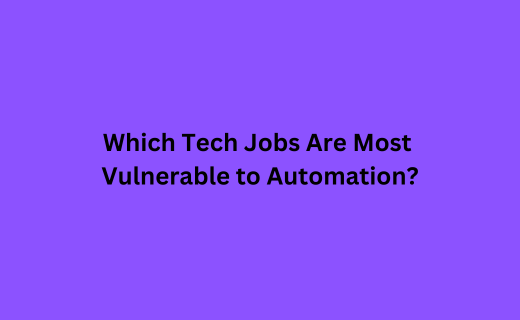-

Which Tech Jobs Are Most Vulnerable to Automation?
Automation is relentless. Basic automation takes simple, rudimentary tasks and automates them. Yet as AI grows more powerful and versatile, jobs that once seemed safe from automation may now be at risk of vanishing -- forever.
Employers can save time and money by investing in automation, especially within IT, says Kevin Beasley, CIO at ERP software provider VAI. “CIOs are currently looking for a technology stack that improves efficiency through automation, but also allows IT teams to focus on innovative projects that improve business outcomes,” he explains. On the other hand, many enterprises are facing an IT talent shortage. Automation can help fill the gap by eliminating routine tasks, allowing IT leaders to focus on existing skilled talent without increasing labor cost.
The question of which IT jobs automation will eliminate next isn’t new. “For example, we have over the past several years automated many of the tools used for the maintenance of business applications and operating software,” says Jeremy Kushner an advisor at IT support firm BACS Consulting Group. “We’ve also automated [network] monitoring and alerting.” Now, machine learning tools and algorithms are opening new doors by automating network predictive maintenance and fraud detection tasks.
Most Vulnerable
The IT operations jobs most vulnerable to automation are related to routine operations, such as first contact help/service desks, data center operations, technology problem resolution experts, and software testing, says Ola Chowning, a partner at technology research firm ISG. Automation’s greatest benefit is quality, she notes. “In operations, the ability to learn from previous similar events, analyze, and then apply the action best predicted to resolve the event occurs much more quickly and more dependably with automation and cognitive [technology] applied.”
Chatbots are taking over many assistance/service desks while AI-driven automation is fueling the rapid decline of help desk agent jobs, Chowning says. Similarly, the expansion of cloud-based infrastructure at the enterprise level in data center operations for monitoring and installation/deployment, and the use of autonomation using AI and ML at the platform level, particularly in cloud, will pose a threat to many current job holders. “Testers will continue to see a job market depletion as both RPA-like rote automation and AI- and ML-fueled test automation tools are applied to exercise code with much more sophistication and with far greater velocity and accuracy,” she predicts.
Software developers, particularly web development or basic coding professionals, may also begin seeing their jobs falling victim to automation over the next few years. “With the rise of low-code and no-code development platforms, it’s becoming easier for non-technical users to create websites and web applications without the need for specialized IT skills,” says Diana Mingels, head of machine learning at Kensho Technologies, S&P’s AI innovation hub. “Additionally, recent advancements in large language models, trained on immense volumes of publicly available code, are making it possible to write code based on the description of the objective provided in a form of natural language.” She points to GitHub Copilot as an example of such a tool.
Kushner notes that his firm recently used ChatGPT to successfully create and enhance an application solution outline. “Once ChatGPT had created the outline and key steps, we then asked it to create and export the code, which it was able to successfully do,” he explains. “This didn’t require an individual with scripting or coding experience -- we were able to do this with non-technical staff.”
On the Bright Side
The good news about automation is that it tends to open in-demand job opportunities in related areas, as well as within automation itself. “For service desk agents and data center operations personnel, becoming adept at Chatbot or data center autonomation tools creates an excellent transition opportunity,” Chowning says. “It requires knowledge of your current role with the addition of learning what are often simple drag-and-drop technologies; no coding required, in most cases.”
Automation itself as a career path is expanding, Chowning observes. “Becoming skilled in one area can more easily allow a person to extend to another area, which is a good thing, since these automated and cognitive technologies continue to spread functionally,” she explains.
Coming Next
Today, automation is primarily targeting routine jobs. “In a few years, we’re going to see automation transforming highly-skilled professions, like software engineers and data scientists,” Mingels predicts.
Ultimately, IT professionals are responsible for their own growth and development, Mingels says. “We need to be aware and prepared to learn and teach others to adjust to a very quickly changing IT landscape,” she notes.
Mingels believes that every automation decision should be accompanied by a plan describing how to upskill or shift-skill existing jobs. She also feels that new education tracks and strategies are needed to ensure that instruction keeps pace with change, preparing young professionals with “the right arsenal of knowledge” for a rapidly evolving IT job market.
MIngels advises IT professionals to face automation head-on. “Ask yourself, what can you contribute beyond your current responsibilities?”
Follow us on LinkedInAbout the Author

Kamal Rastogi is a serial IT entrepreneur with 25 yrs plus experience. Currently his focus area is Data Science business, ERP Consulting, IT Staffing and Experttal.com (Fastest growing US based platform to hire verified / Risk Compliant Expert IT resources from talent rich countries like India, Romania, Philippines etc...directly). His firms service clients like KPMG, Deloitte, EnY, Samsung, Wipro, NCR Corporation etc in India and USA.